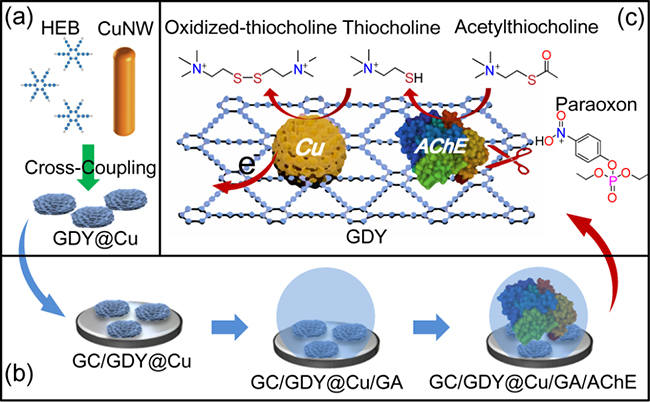Organophosphorus pesticides (OPs), a class of lethalnerve agents widely used in agriculture, pose an extreme threat to human health and environment.
Electrochemical biosensor based on the inhibition of acetylcholinesterase (AChE) has been regarded as an ideal tool for rapid detection of OPs, but it is suffered from the sluggish electrode kinetics and high oxidation potential toward signal species.
Recently, a research group led by Prof. LU Xianbo and Prof. CHEN Jiping from the Dalian Institute of Chemical Physics (DICP) of the Chinese Academy of Sciences (CAS) has developed a high-performance electrochemical biosensor for the interference-free detection of OPs.
This study was published in Biosensors and Bioelectronics on Feb. 21.

Schematic illustrations of the biosensor fabrication and OPs detection (Image by NIU Kai)
The researchers synthesized a nanocomposite of ultrafine Cu quantum dots (QD) uniformly loaded on three-dimensional ultrathin graphdiyne (GDY) nanosheets (denoted as Cu@GDY) via a one-step strategy. Cu@GDY showed a high density of active sites with persistent stability.
Then, they fabricated an AChE biosensor based on Cu@GDY to detect OPs and found that the results of the Cu@GDY nanocomposite could amplify the electrochemical signal and reduce the oxidation potential for OPs.
Moreover, they investigated the potential electro-catalysis mechanism and structure-activity relationships of the proposed biosensor through characterizing the kinetics of electrode reaction, the source of active sites, and the interaction between signal species and active site. "After theoretical derivation and experimental verification of enzyme inhibition kinetics, the biosensor was verified to have high sensitivity to detect OPs," said Prof. LU.
This work was supported by the National Natural Science Foundation of China, and the Dalian Science and Technology Innovation Fund. (Text by NIU Kai)